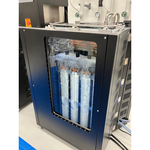Protein2PAM model enables single-shot customization of Cas enzymes for alternate PAM recognition, validating the power of machine learning models to design bespoke biological systems at scale
Profluent Demonstrates AI Can Engineer Protein-DNA Interactions Without Iterative Laboratory Screening
Thermal for Profluent
press@profluent.bio
Profluent, the AI-first protein design company, today announced Protein2PAM, the first in a series of AI models that will broadly focus on protein-DNA interactions. Trained on large, bioinformatically curated databases of mined biological sequences, Protein2PAM demonstrates the power of Profluent’s language models to reprogram complex biological systems without the need for wet laboratory evolution or structural modeling.
Profluent published results in a bioRxiv preprint demonstrating a first proof-of-concept for gene editing, one of the many potential applications of its broader platform.
“Nature has provided us with a blueprint to learn the molecular interaction landscape of proteins, which we can leverage to steer design toward bespoke functions,” said Ali Madani, Profluent co-founder and Chief Executive Officer. “Protein2PAM confirms that we can use large language models – with fine-grained control over function – to scale precision engineering without the cost of expensive wet lab processes and equipment. It’s a huge step forward, and we are excited about how this will ultimately transform the ability to design custom proteins tailored to specific needs across so many applications.”
As a first use case, Profluent created Protein2PAM in order to increase CRISPR-based editing flexibility and unlock new therapeutic targets. Cas enzymes are able to bind and cleave target sequences only if they contain a short flanking DNA sequence known as a protospacer adjacent motif (PAM). While the PAM is crucial for CRISPR specificity, it fundamentally limits the scope of genomic sites that can be targeted and edited. Traditional approaches, such as metagenomic mining and manual protein engineering, can modify or relax PAM specificity. However, these methods are either labor-intensive and difficult to scale or risk increasing off-target activity. Protein language models offer a robust and scalable solution to overcome these challenges.
Profluent trained Protein2PAM on a dataset of protein-PAM associations consisting of 45,816 pairs of Cas proteins and PAMs, representing an approximately 200-fold increase compared to the largest publicly available dataset. Without any laboratory evolution or structural modeling, Profluent’s AI platform engineered Cas variants that recognize new PAMs and display increased DNA cleavage kinetics by up to 50-fold compared to their natural counterparts. These results were validated through wet lab assays performed in collaboration with the Kleinstiver Lab at the Center for Genomic Medicine at Massachusetts General Hospital (MGH) and the Department of Pathology at MGH and Harvard Medical School.
The company has launched the Protein2PAM Server, an interactive and freely accessible platform designed for academic and industry researchers worldwide. This tool enables users to explore and optimize PAM selectivity for their Cas enzyme of choice. As the latest AI release from Profluent, Protein2PAM highlights targeted applications of its broader platform, addressing critical challenges across therapeutic, agricultural, and industrial domains.
About Profluent
Profluent is an AI-first protein design company headquartered in Emeryville, CA. Founded in 2022, Profluent develops deep generative models to design and validate novel, functional proteins to revolutionize biomedicine. The company is backed by leading investors including Spark Capital, Insight Partners, Air Street Capital, AIX Ventures, and Convergent Ventures. To learn more about Profluent’s mission to decode the language of life with AI, visit profluent.bio.
View source version on businesswire.com: https://www.businesswire.com/news/home/20250107164590/en/

 Business wire
Business wire 












Add Comment